Good news on the mother and baby who were separated
An e-mail we received from the Dateline inbox:
Hello my name is Nydia Cuenca I am the niece of Ann Perez which is Lois Trahan sister. I am here in Easton, Pa. and my mother and I spoke with Ann Today who informed us that they all have arrived including Lois and Blaze at our family house in Houston, Texas. Lois Trahan wanted us to let you know that she found her baby two days later and she thanks everyone who help her. Please let Hoda Kotb know that Blaze has been found Thank God. Thank you.
The new nomads (Hoda Kotb, Dateline correspondent)
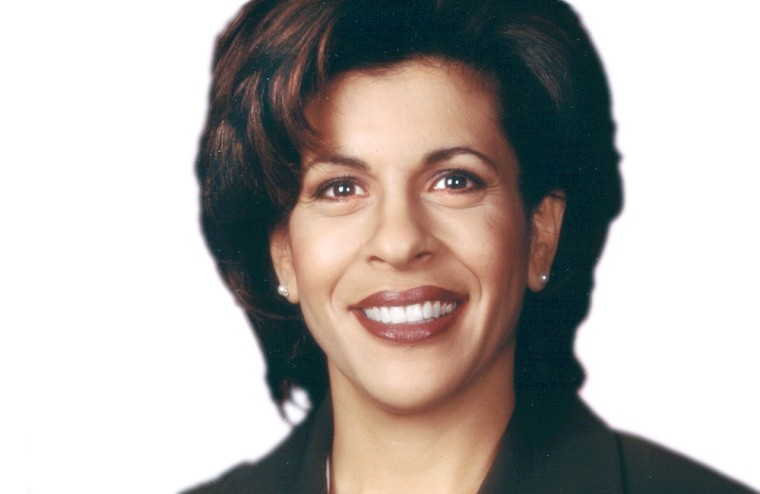
JUST OUTSIDE NEW ORLEANS, La.— Just drive anywhere in this region and you’ll see them: lonely figures, making their way out of New Orleans the only way they can — by foot. In the early morning light, they cast a dark shadow on rescue efforts that for them, never came.
They are modern American nomads. Fleeing anarchy.
The first man we met was a man with a legendary Louisiana Cajun name— Ricky Breaux. He arrived soaking wet after he swam a mile across a canal to reach dry land. He knows where he came from: a small town just outside New Orleans where he has deep roots. But he has no idea where he’s going. “I’m gonna walk ‘till I get home. It don’t matter,” says Breaux. “I don’t care if the good Lord maybe give me a ride and if he don’t.”
And just as we were talking to him, along came a make-shift family, an eclectic group of young people who worked in the French Quarter: bartenders, tattoo artists, and even a horse and buggy driver. They were trying to make their way out of New Orleans for five days. They got caught in one squalid, dangerous, makeshift shelter after another.
“Some people started shooting. There were dead people in the neutral ground. They wouldn’t clean out the bodies, there was sewer everywhere,” says Megan Gobel. Like everyone else, Gobel hadn’t been able to get in touch with her family out of state. Luckily our cellphone worked this time and her father, a pastor in Ohio, answered. At least now the group had a plan: a church van with her dad behind the wheel, was coming to the rescue.
That’s great news for them, their gamble to set off on foot paid off. But for the thousands of people here at this relief station these people are doing as instructed, they’ve been waiting for hours and hours for buses that still haven’t arrived. A couple of buses showed up but they were dropping more people off.
This type of situation has some wondering if they should set out on foot as well. And some did. We saw a group of four in the distance, fending for themselves. The four had been tending to hundreds of victims. Three, were nurses. “We haven’t slept. Since Sunday, I’ve been taking care of patients,” says Dottie Peralta, a nurse. “This is a life-changing experience and it’s very disheartening that no one came to help us,” she adds. Peralta had walked for miles on a bloody foot, along with her 15-year-old daughter, and 2 other nurses were at one of the areas’ flooded hospitals.
“There’s no possible way for anybody that hasn’t been down there in it to know what its like,” says Mike, another nurse. Mike knows his home is gone. So they’re all trying desperately to get to a relative’s house about 50 miles away. But with a gash in his leg, they were barely making it.
"I’ll get there sooner or later. It can’t take more than 5 or 6 days. Have my feet on dry ground and get to see my family," he says. A med-tech traveling with Dateline tended to their wounds, and helped them flag down an ambulance.
It the groups who found that taking a chance by going off on their own... was better than waiting for help that might not arrive.
E-mail Dateline@MSNBC.com.
A morning in New Orleans— and many stories of anguish (Adam Gorfain, Dateline senior producer)
I just got off the phone with Tim Uehlinger, Dateline's senior national producer, who has been traveling with correspondent Hoda Kotb in New Orleans, reporting on the unfolding crisis there. Tim is one of our most talented and intrepid producers, who went to Iraq to cover the war for NBC. I asked him how what he was seeing there compared with what he saw in that desert war zone.
"It's worse," Tim said, by phone from a satellite truck. "There are more refugees in more dire need here than in Baghdad."
Tim and Hoda started their reporting today at first light, and it wasn't long before they met an eclectic mix of people on foot, walking the highway, some unsure where they were headed, but looking for refuge from the storm. Some had been walking for miles, for days. First, they saw a man who'd swum a mile to get to dry land, a lone figure on a highway, the occasional car roaring past him. Next, a group of young people, some tatooed and pierced -- all from New Orleans. A girl in their group used Hoda's cellphone to let her father know she was alive, and to ask him to come get her and the group. She and the others in her little band of refugees wept.
Hoda then met a group of nurses who had fled a hospital after the patients were evacuated. They'd spent days in the hospital, doing their best to care for the patients, with little food and no working plumbing. They used a recent thunderstorm to take a shower in the rain. It was the first time they'd been clean since the storm.
Tim and Hoda's morning is just a glimpse at what people are experiencing in the hurricane zone.
In tonight's Dateline special, you'll get the bigger picture, and the very latest on how relief efforts are faring. I hope you'll join us tonight at 9, 8 eastern, on NBC.
Editor's note: Don't forget to watch "A Concert For Hurricane Relief," on NBC, tonight at 8 p.m. on NBC, CNBC, and MSNBC.
Also, as many of you have requested via e-mail, we are working to update you on the story Hoda brought you last night — on the fate of baby Blaze, and whether or not he has been re-united with his mother Lois Trahan. We'll keep you posted.
• |
Mother and baby, separated in the refugee chaos (Hoda Kotb, Dateline correspondent)

INTERSTATE-10, JUST OUTSIDE OF NEW ORLEANS— It was a very sad day here. The dimensions of this disaster are so mind-numbing it seems impossible to understand what’s happening… until you meet the survivors face-to-face.
With a constant whirring of military choppers, it makes it seem like Baghdad— except Baghdad has food and water.
Interstate-10, one of the nation’s biggest arteries, cuts all the way from Florida to California. I spent sometime on interstate right outside of New Orleans, which has become a river of refugees on foot — hearing one heartbreaking story after the next.
People there were boarding buses, not sure of where they were going to end up. They boarded not knowing if they would end up at the New Orleans airport, in Dallas, or Houston.
Amidst the sea of trouble and tears, we found a woman who was beyond consolation. Her story would stun even weary emergency workers. Until Monday, Lois Trahan was a homemaker with two children from Calmette, La., a middle-class suburb just outside New Orleans. She saved herself and two children by climbing to the attic of her home, breaking a hole through he roof and waiting for rescuers.
But that wasn’t the worst of it: When she got to the highway on Wednesday with her two kids and her dog, she thought she’d finally be able to board a bus to get somewhere, anywhere.
Desperate survivors pushed and shoved as she was trying to board a bus. She needed help with her two-year-old son, but as she handed the child off, she got pushed to the ground in a crush by the door.
“I went to hand the baby in the bus; a lady took him from me. But when I went to get on the bus, they pushed me out. I was three people back. By the time I got back up, and the bus was gone,” says Trahan.
2-year-old Blaze, who is easily identified by his birth mark on his forehead, is now separated from his mother. For 24 hours, no one would help Lois.
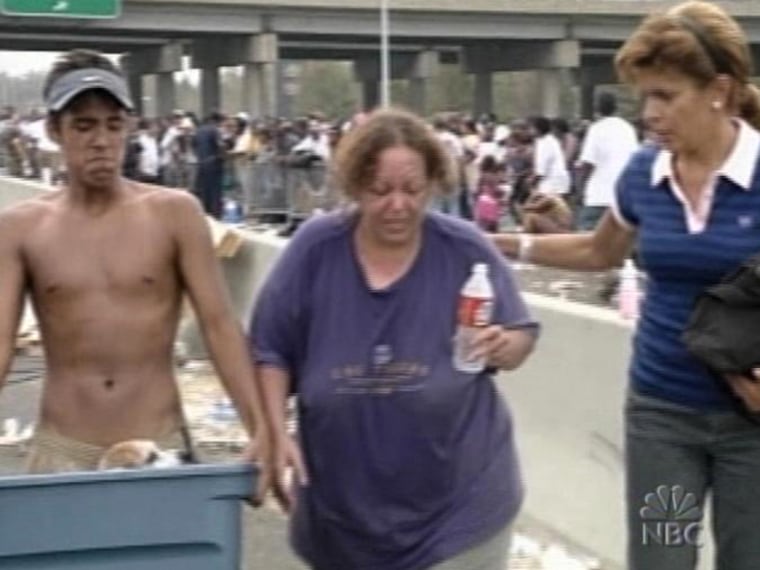
We caught the attention of a police officer. With Lois, we explained the situation to Louisiana State trooper Sgt. John Childers. He helpfully put her on the next bus that arrived. “It may be crowded, but at least you can be on there to Houston and start trying to find your family,” he told her.
It was the first time Louis Trahan had a glimpse of hope all day. And then officer Childers, went beyond the call of duty: He took Louis Trahan, her other son, and her dog in his own patrol car.
And just as Lois' bus pulled away, even more choppers were arriving with more survivors.
Tonight, Sgt. Childers is hoping the family has been reunited, but with no communication he has no way of knowing if his effort has paid off.
Sgt. Childers has asked me to let him know if we found out if and when Lois has been reunited with her baby. I took his number down on my notepad. Tonight, my notepad is filled with phone numbers of people asking for information or asking us to make calls. One man asked me to call his wife just so she would know that he was okay. It is that hard to communicate from around here.
But in this despair and lack of hope, every now and then, I would hear someone say, “Thank God, I’m alive.”
E-mail: Dateline@MSNBC.com
• |
And now, a hurricane of anger in New Orleans (Dennis Murphy, Dateline correspondent)
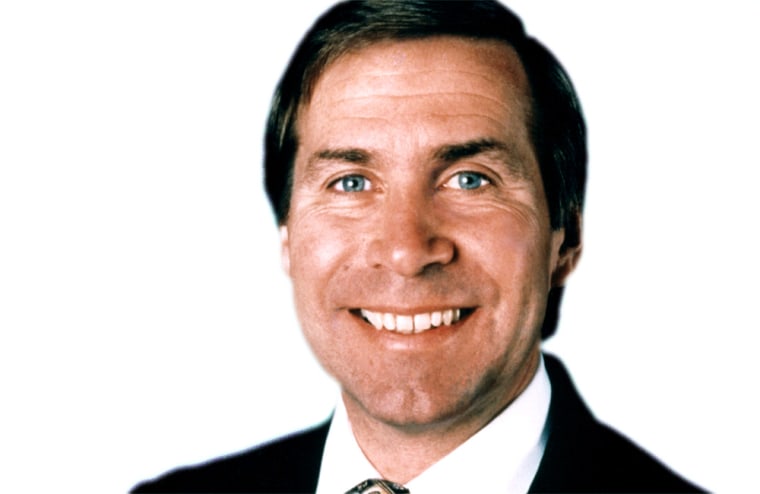
The word from Washington tonight is “We will meet this challenge.”
The desperate cries from the ravaged region ask, "When?"
Days now after Hurricane Katrina hit, people in coastal Mississippi and in New Orleans are still without food and water.
Some have likened the Big Easy to Dodge City: Chaos. Looting. The law, like the levees themselves... just not holding.
The question is why are people dying? Why aren’t they getting help?
First the water boiled over New Orleans. Now it’s the anger.
Today, we saw some Category Four rage from stranded citizens with only the clothes on their back— scraps of food, no water, carrying terrified children and moving like zombies toward this city’s ground zero. The Superdome and nearby convention center which has become its own ring of hell in the last 24-hours.
Their challenge to those outside their island of despair is this: Where is the government? Where is the relief?
“We might as well just lay down and die. They’re doing more for the people in Iraq than they’re doing for they’re own American people,” said one man.
Outside the convention center where the crowd chants “help” there are scenes few of us could believe are taking place in America in the 21st century: One man on the sidewalk dying of dehydration, another in an aluminum chair already gone.
“It’s cruel and inhumane punishment for somebody— a loved one— to sit in the sun and bake!” one New Orleans man said on camera to NBC cameraman Tony Zumbado.
Some have been here milling about for three days in sweltering heat. Mothers are at wit’s end. There are no medics. No organized relief agencies in sight for these hurricane victims.
Inside the convention center, encampments of survivors are living hour to hour, expecting good Samaritans who never show.
Trash is piling high. Bathrooms are wretched.
Camille Fletcher has been marooned in the convention center for three days. She says her sickly 83-year old mother needs heart medicine.
“They just want food and support,” says Zumbado. And through his lens, he’s seen in New Orleans something he’s never seen in this country.
In the other refugee center, the Superdome, fistfights have been reported and small fires set. Some medical personnel are reported to be afraid now of the simmering crowd stuck inside a stifling arena.
Heavily armed National Guardsman outside secured the gates during an evacuation disrupted by a gunshot fired at an arriving military medivac-helicopter.
Hundreds boarded buses to take them to the Houston Astrodome, 350 miles away, to yet another refugee shelter where they may have to live for months.
In the city, looting continues. About 1,500 police had marching orders last night to concentrate on shutting down the lawlessness.
The demands to keep the city from blowing and concerns about his own family’s safety was too much for one city police officer who weeped openly on camera.
It fell today to Homeland Security Secretary Michael Chertoff in Washington to respond to that chorus of angry voices. Federal agencies say the cavalry is coming: a multi-billion dollar relief effort spearheaded by 30,000 military and National Guard personnel due on the ground in the region by the weekend.
President Bush today asked two former presidents, his father and Bill Clinton to raise money for the victims of Hurricane Katrina as they did for the victims of the Asian tsunami last winter.
Authorities in Biloxi say they have come upon an unhappy but not unexpected discovery... more bodies being found by the hour. Coastal Mississippi residents are complaining too about food and water arriving in no more than a trickle.
By early evening Thursday, 2,000 New Orleans refugees had arrived at the Houston Astrodome for who knows what kind of future. There were lights, food, and shelter... but no promised land— not with so many new arrivals driven to the brink by the loss of those who didn’t make it with them.
E-mail: Dateline@MSNBC.com
So many sad stories to tell (Adam Gorfain, Dateline senior producer)
We're hard at work again this afternoon on another special broadcast for tonight on the aftermath of hurricane Katrina. We're calling it ""Katrina: Devastation in the Gulf."
Yesterday, I mentioned that several of our people were headed into the hurricane zone, and tonight, you'll be hearing from them. Stone Phillips will be anchoring the show from Biloxi, Mississippi. And Hoda Kotb, who spent a lot of time in New Orleans as an anchor there before coming to Dateline, has been reporting on the ground in The Big Easy for us and you'll soon be seeing the remarkable stories she's finding there.
In the meantime, I'm told the conditions where our people are have been difficult. I understand several of our producers and correspondents ended up spending the night in very unusual places: one team got their night's rest in a hospital in New Orleans, while another was welcomed into a private home in Alabama. And while our people overcome obstacles in the hurricane zone, many of us helping get their work to you from the safety of New York or Los Angeles are saddened by the pictures and stories we're seeing. So many people at ground zero are saying the situation is desperate. The pictures of mothers and babies, the dead in the streets, are hard to watch. It's frustrating not to be able to personally help everyone in need down there. But we can tell their stories. And we will.
The Dateline special "Katrina: Devastation in the Gulf," airs tonight at 10 p.m./9 C.
• August 31, 2005 |
Heartbroken for New Orleans (Hoda Kotb, Dateline Correspondent)

I worked in New Orleans for six years and I was one of the evening anchors in the city. And one thing that was sort of a constant drum beat was the fear that “the big one” was coming. That's kind of how people there lived. You're in a place that is so vulnerable, you're just sitting there waiting for this huge storm to come and just wipe your city out.
All the people who were a bit older in New Orleans used to always talk about two things, two storms, and just two: Hurricane Betsy and Hurricane Camille. It became folklore — those two hurricanes were as bad as it ever got in New Orleans.
But New Orleans was always so lucky. The hurricanes would go to the right or go to the left. It always just missed our city.
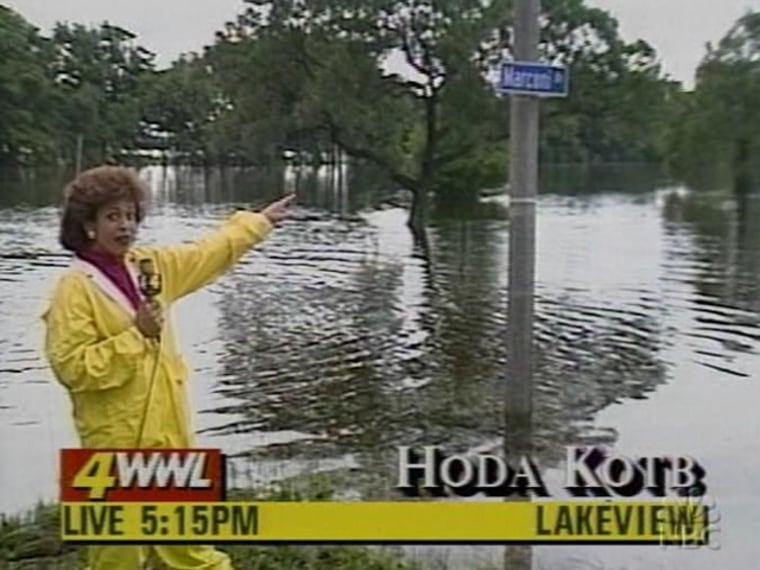
I have to tell you, the number of times when I worked there that you heard the meteorologist say “Go now to Home Depot. Get wood.” And every hurricane season, people would get the boards, nail them up there, and do everything they were supposed to do. And then no hurricane came.
And now look what we have: Something's that worse than Camille. Worse than Betsy.
It's really heartbreaking — this is a city that is so vibrant and so full of life. I mean, you think Mardi Gras. You think Bourbon Street. You think the French Quarter. You think fun. And then like that, you see a city that's paralyzed. No water, no sewage, people still trapped. And it's just heartbreaking to see.
The pictures of the people on their rooftops, the pictures of the people being rescued — I don't know them, but I know just who they are. Because New Orleans is a very poor city. It's a city that has a poverty rate of 30 to 40 percent and the people that you're seeing in those pictures are people who, I bet, had no way out. They just didn't. The house is all they have. So they're hanging on for dear life. And then suddenly, they're on the attic with an ax, cutting their way out, so they can be on the rooftop and pray that some stranger comes by and saves them.
When you look in the Super Dome and you see all those people in there, and you're wondering, “Why didn't they leave? Why didn't they just leave?” You know, a lot of those people couldn't. They don't own cars. They don't have means, they don't have money. They don't have anything.
There are some people who just decided, “I was born here and I'm going to die here.”
My fiancée and I have a friend who's down there named Gene. He's a 76-year-old guy and he has a dog, and he didn't want to leave the city. And I tell you, when I'm looking at those pictures, I'm looking for Gene. After the first day, I thought, “Oh, he's going to be okay, because it didn't look so bad.” Remember, the waters weren't so bad. And then suddenly, everything started to rise. And that's when it got scary.
My best friend lives in New Orleans. And she's in the news business, too, like me. And she had to send her 2-year-old daughter up north to Jackson, Mississippi, with relatives. And her husband's a police detective. So imagine if this were you, you can't get in touch with them because there's no power. And you're running around the city reporting and seeing all this devastation. And then you get a phone call that says your house is gone. Just like that.
In the beginning, everyone was saying New Orleans dodged a bullet. And there seemed to be a little bit of a sigh of relief. And it turned out that in fact, this was the worst case scenario. It's worse than everyone thought.
It seems really dire right now. But I hope and pray that the people down there do what they always do, which is pull it up by their bootstraps… and try to rebuild.
E-mail Dateline@MSNBC.com
• August 31, 2005 |
This is more than a war zone (Kerry Sanders, NBC News Correspondent)
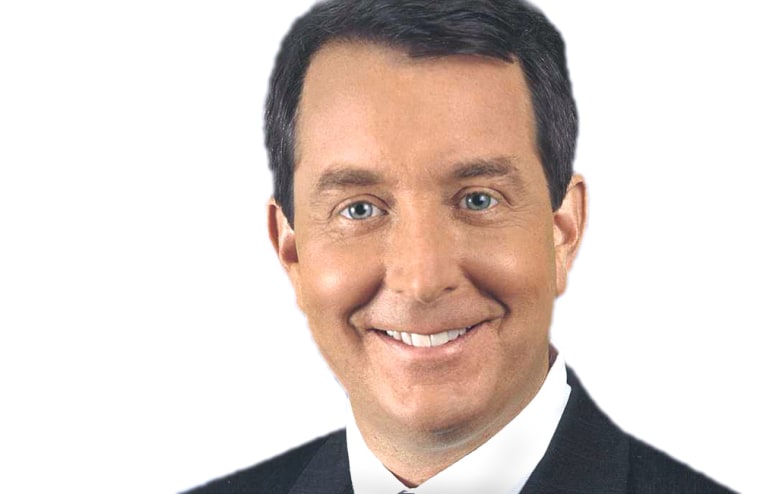
You can only see the full picture of Katrina's catastrophic damage by flying overhead. On a helicopter, using US-90 as a guide, we surveyed the Mississippi coast. The road, as bad as it was, would lead us along the coast there.
Over Bay St. Louis — where the eye of Katrina passed over the strongest winds, we found civilization... or what remained of it. I saw what 145 mile an hour sustained winds does.
There's so little left. Inside that rubble I saw not only the dreams, but the lifetimes that people had: family photographs, Little League awards, wedding albums — all gone.
If somebody says, "Well that looks like a war zone down there," they're wrong. I've covered wars. I just got back from Iraq a week ago and this is not a war zone. In a war zone, you have pockets of damage. Here, you have mile after mile after mile.
We saw a Coast Guard helicopter continuing the search and rescue missions. In this particular case, it may simply be recovery because there's so little left in this area.
In the last 21 years, I've covered big hurricanes, Gilbert, Hugo, and Andrew — the granddaddy of them all. This is it. This is the biggest natural disaster I've ever seen in my two decades of reporting.
Send your e-mails to Dateline@MSNBC.com
• August 31, 2005 |
Not my New Orleans (Hank Mendheim, Dateline producer)
I keep seeing the video coming across the screen, each image worse than the next and I keep telling myself that this is not "my New Orleans." I was born in that city, raised nearby and after college I went to work in New Orleans as a television producer. I have gone to countless Mardi Gras parades, walked the streets of the French Quarter and had beignets more times than I can count. Still, I don't recognize these images coming across the screen: the floods, the devastation, the heart-wrenching pictures of one of the most beautiful cities in America. Rather, it was.
We always said in New Orleans, “One day it will happen. And one day it will.” Hurricane Katrina was not the "the big one" that everyone kept talking about. The storm actually missed New Orleans. The worst devastation is always on the east side of a hurricane. New Orleans was on the west side of Katrina. Now, imagine what will happen when "the big one" does hit New Orleans head on? It's a scary thought.
I am fortunate though. By some miracle, my mother, who lives just north of New Orleans in the city of Hammond, was able to call me yesterday to say that she was fine. She has a lot of trees down in her yard and lost some shingles on the roof, but she is fine. My brother-in-law managed to use his generator and power up his computer to email everyone to say they too were safe. Now comes the hard part. Living. There is no electricity and won't be any for weeks. If you have ever been to Louisiana in the summer, you know exactly how bad that is. They must drive nearly an hour to get food and water and ice. They are living a miserable existence, but they are living. That's what's important.
I was going to go home September 9th to see my mother for her birthday. The airline called me today to say my flight was canceled. It's probably for the best. Even if I can get to New Orleans on September 9th, I'm not sure how I would get to my mother's home an hour north of the city. All roads were heavily damaged. This is the first year that I probably won't be able to speak to my mom on her birthday. This is the first year that I can't send her a gift or a card because she has no way to get it — they have no mail service. So I am not exactly sure when I will be seeing my mother again, but I know I will. She is alive. And she is well. She survived Hurricane Katrina. So many others, I am sad to say, did not.
E-mail Dateline@MSNBC.com
• |
An enormous story (Adam Gorfain, Dateline senior producer)
Right now, more than 50 Dateline staffers are working to bring you the very latest on Hurricane Katrina. Some producers are working with correspondent Dennis Murphy to pull together the news of the day. They've been gathering video feeds from the hurricane zone, interviewing experts around the country, and giving Dennis the facts, figures and material he needs to tell the story. He's the best in the business at it, and he'll have the story covered from the big picture to the smallest detail. Other producers are working with NBC News correspondents on the ground amid the devastation along the Gulf Coast, to help bring you the stories they've found. From what I've seen, we have some very dramatic and moving tales to tell tonight.
Finally, many of my colleagues at Dateline are on their way right now to ground zero of the catastrophe. Some left this morning, armed with satellite phones and friendly advice to bring plenty of water, food, and protective gear to get around in what will likely be very trying and dangerous conditions. This is an enormous story, which we'll begin telling tonight, and likely continue reporting in the days, weeks, and months to come.